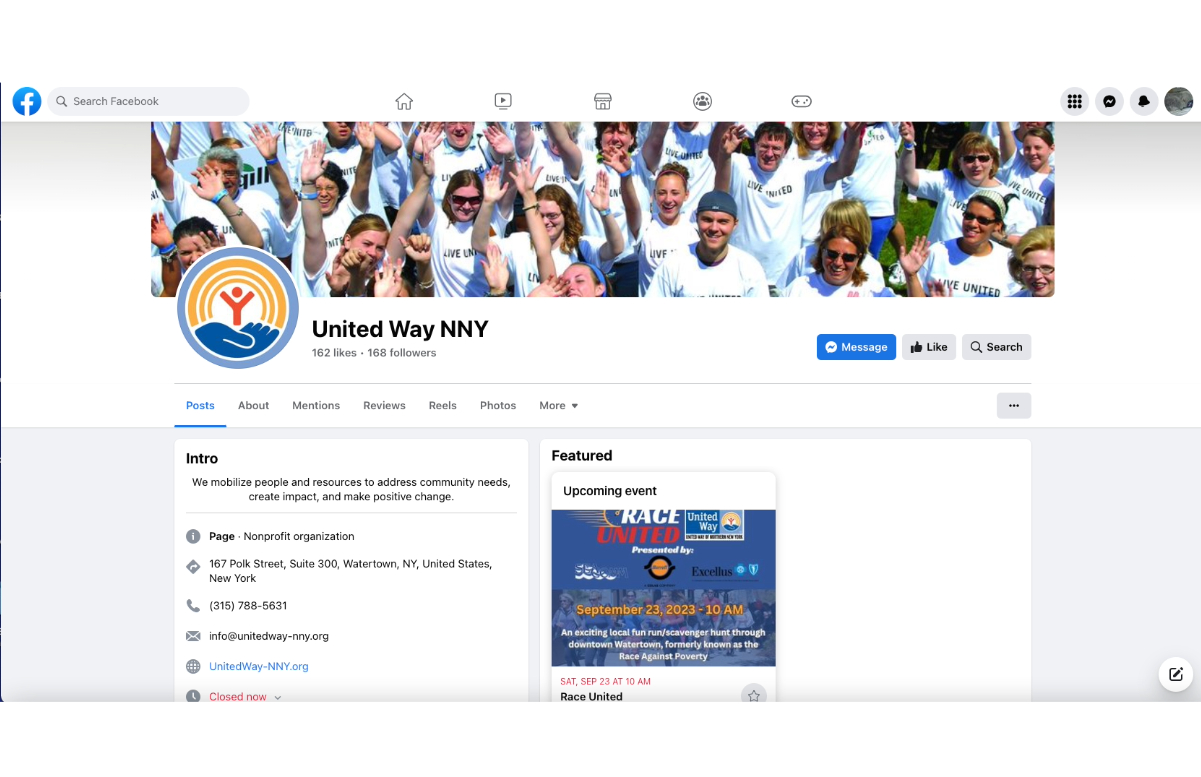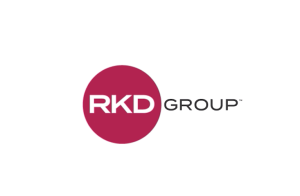The leader of the small United Way of Northern New York was shocked when the organization’s Facebook page was suspended without warning and little explanation two weeks ago for what was termed a “community standards violation.” The timing could hardly have been worse for the Watertown, New York nonprofit, which was about to start registration for what was anticipated to be its biggest fundraiser of the year.
The cause is thought to have been the rebranded name of the group’s Sept. 23 “Race United” event that CEO Dawn Cole now suspects might have tripped the social media giant’s algorithm for detecting hate speech. However, she admits she isn’t 100% sure since a detailed reason wasn’t given for the action, nor was any indication given as to when or if the group’s account might be restored.
“It really threw us for a loop and practically crippled us for a week,” said Cole. “For a typical event, we might have 75% or 80% of ticket sales attributable to Facebook, and here we were just getting started on our biggest community event of the year. And then you start worrying about what you might have done to trigger the algorithm and if starting a new page will make you look even guiltier. So, there was this period of several days where we were frozen in fear and really suffered some sleepless nights.”
Formerly known as the Race Against Poverty, the group’s annual scavenger hunt through downtown Watertown is set to resume for the first time since the pandemic. Now the organization is being deprived of its biggest publicity and fundraising tool that includes previously posted photos, content, and more than 2,000 actively engaged followers on Facebook. The size of the group’s following might seem paltry to some but can be critical to getting the word out in a small community.
The inability to get answers or communicate with anyone at Facebook parent company Meta compounded their frustration. An inquiry to the company by The NonProfit Times went unanswered.
“Facebook lets you do an appeal, which is a small box where you can type a little message. And I did that thinking we’re United Way, we’re a worldwide trusted brand, and that would take care of it. But, it didn’t,” Cole said. “I still don’t know what happened, and other counterparts I’ve spoken to have told me I’ll probably never know.”
With the event mere weeks away, members of her group decided they could no longer wait. They’ve started a new Facebook page under the name United Way NNY. The new page had 168 followers as of Wednesday and replaces the former “United Way of NNY” page.
Social media snafus such as this appear to be a growing occurrence as policing of online content intensifies. Cole said that two board members told her the same had happened to a credit union and mental health services provider where they work. “It turns out this is a relatively common thing, and it could be anywhere from a month to four months before you get your page back, or you might never get it back at all,” Cole said.
Heather Mansfield, editor of the Nonprofit Tech for Good newsletter, confirmed several of her subscribers have been similarly impacted. She sees little likelihood social media companies will adopt more user-friendly practices anytime soon. This was borne out by a recent poll she conducted via the online platform LinkedIn. Only 3% of 2,597 nonprofit leaders who responded said they would be willing to pay even $20 per month to Facebook for access to customer service and other premium tools.
“Until Facebook offers such a service and until nonprofits are willing to pay for it, customer service by bot is likely to remain the harsh reality of using social media,” Mansfield said. “Providing human-based customer service is not a high priority for Meta, and in truth, is likely impossible even with a paid service. There could be 100 million or more pages on Facebook, and to provide efficient and helpful customer service for those pages would require Meta to hire thousands of employees.”
The episode is an object lesson in the downside of relying on social media companies with content moderation practices that are often fickle and deliberately vague. “If it were up to me, I would be done with social media,” Cole said. “But when you’re trying to practice good stewardship at a small nonprofit with a basically nonexistent advertising budget and depend on donations from the community, it seems unthinkable not to use a platform that gets you in front of so many people at no cost. But I’m now starting to see that there is a cost.”
The United Way’s staff has begun advertising the upcoming event by word of mouth and posting fliers and posters throughout the community. “I have a very young staff and for them it was like the sky was falling, but I told them we’re going to go ‘old school’ on this,” Cole said. “They both looked at me like I had two heads at first and said it’s going to be so much work, and it is. But back in the day, that’s what we did. We went out and talked to people and told them we have this great event coming up and here’s why you’re going to love it.”








